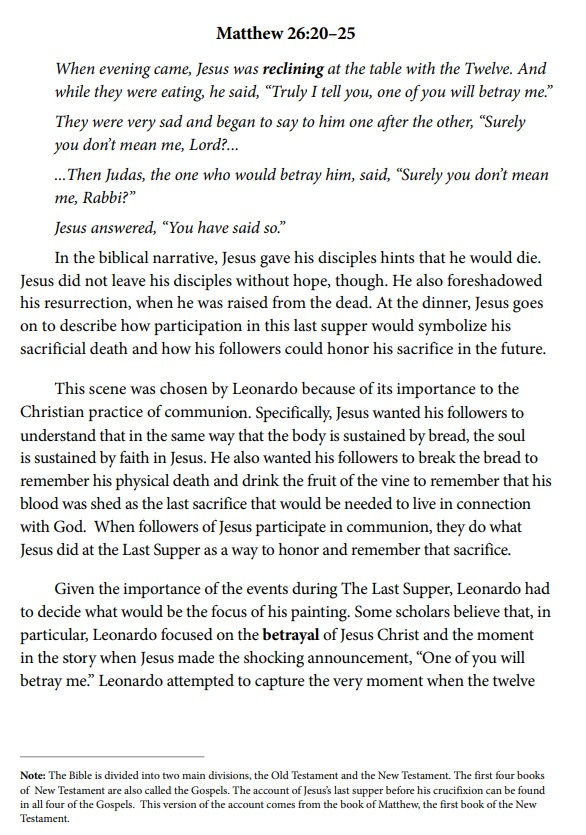Texas Elementary Curriculum To Serve Kids Heapin' Helpin's Of Bible Stories
'Freedom of Religion' also mentioned, but mostly as a drop-down menu.

The state of Gilead Texas this week proposed a new curriculum for elementary schools that adds readings from the Bible to reading and language arts lessons, but don’t worry, it’s not like the state is trying to preach at kids, at least not just yet. It’s just stories from the Bible so far, like a couple of chapters for second graders on the story of Queen Esther, and another bit for fifth graders about Leonardo da Vinci’s The Last Supper, and heck, everyone knows that’s great art, almost as good as his work to save the world through martial arts.
Oh yes, and in both sections, the kids will read (or have read to them) the matching sections of the Bible, and only a crazy raving person would dare suggest that this might be followed up down the road with more explicitly religious teaching, you big silly liberal worrywarts. That’s a slippery slope logical fallacy, so you can’t suggest that’s anything Texas Republicans might consider doing.
Like, apart from the chairman of the State Board of Education, Aaron Kinsey, who said, “You have a chairman who will fight for these three-letter words: G-O-D, G-O-P and U-S-A.”
Or there’s the state GOP’s actual party platform, also released this week, which urges the state Lege and Board of Education to “require instruction on the Bible, servant leadership, and Christian self-governance,” as well as calling for “prayer, the Bible, and the Ten Commandments being returned to our schools,” among other places. (The platform also calls for the death penalty for abortion, so you know it’s a very reasonable document.)
In an interview with The 74, a nonprofit education journalism outfit, Texas Education Commissional Mike Morath explained that the inclusion of material from the Bible is all about cultural literacy, that’s all:
“If you’re reading classic works of American literature, there are often religious allusions in that literature. […] Any changes being made are to reinforce the kind of background knowledge on these seminal works of the American cultural experience.”
True; as with Shakespeare, anyone reading the Bible will be amazed at how full of clichés it is. Courts have also long held that it’s OK to teach the Bible as a work of literature, as long as that’s what’s really going on.
On the other hand, having taught a fair bit, I’d also argue that you can just go ahead and teach American Literature without a Bible class first, treating references to the Bible like you would any other footnote. Nobody needs to read the legislative text of the Smoot-Hawley tariff act to be able to appreciate the reference to it in Ferris Buehler’s Day Off. I remember Smoot-Hawley from both high school history class and from the 1997 book Dave Barry Slept Here, where “THE HAWLEY-SMOOT TARIFF” is a running gag simply because it’s so much fun to say. Barry never actually explains what it was, so readers would have to look it up, as they can just as well do with “Golgotha,” “Lot’s wife,” or “Go on up, you baldhead.”
As Southern Methodist U religious studies prof Mark Chancey told the 74,
“It is reasonable to devote some attention to [the Bible], and state education standards across the nation often require such attention. […] The problem, of course, is that sometimes the legitimate reason of cultural literacy is used as a smokescreen to hide religious and ideological agendas.”
Golly, how could anyone ever suspect that’s what rightwing Christian nationalists might be trying to do, apart from almost everything they say and write to each other before sanitizing it for public consumption?
As the Texas Tribune notes, the new curriculum isn’t quite mandatory, but if it’s approved by the Board of Education in November, public schools will have the option of using it starting with the 2025-26 school year. If they do, the state will provide an extra $60 per student in extra funding.
The new materials are available to view online, and Texas residents can submit comments on them through August 16. We took a look at some of them, like a second-grade reading unit on “Fighting for a Cause” that focuses on people who advanced freedom and equality. After a lesson on Martin Luther King Jr. and nonviolent resistance, there are two brief lessons on Queen Esther and how she bravely stood up for the Jews in ancient Persia.
The story is framed as an actual historical event, with the teacher’s guide listing her as one of “nine historical leaders” whose “dedication and sacrifice” were important in establishing human and civil rights for all. That’s despite the fact that biblical scholars point out there’s no historical evidence to confirm she was a real person at all, unlike the fairly definite existence of the other heroes in the unit, like William Penn, Jackie Robinson, King, and the Hawley-Smoot tariff.
That itty-bitty problem of historical reality aside, the lessons itself aren’t explicitly preachy, which is particularly easy to pull off since God doesn’t even put in an appearance in the Book of Esther.
The teacher’s guide is carefully secular in its framing, although when it discusses how Esther’s story is the basis of the holiday Purim, it explicitly suggests the holiday celebrates how God intervened to protect the Jewish people, even though that’s not stated in the biblical text. Worse, there’s no mention of baking Hamantashen or — and this is true! — celebrating by getting drunk and giving charity to the poor. [It is among the Editrix’s favorite holidays.]
A bigger stretch comes in the fifth-grade lesson on da Vinci’s Last Supper, part of a unit on Renaissance art and culture. The textbook explains it was a Passover meal and notes that this would be “the last Passover for Jesus.” That’s a segue to reading a passage from the New Testament:
The Bible explains that Jesus knew that after this meal, he would be arrested, put on trial, and killed. Let’s read the story in the book of Matthew to see for ourselves what unfolded during the supper:
Here, have a screenshot:
That’s way more eternal life stuff than absolutely necessary for fifth-grade art appreciation. The text could just as well have stuck with the observation that Leonardo’s painting dramatizes the disciples’ shocked reaction to Jesus saying “One of you will betray me,” and called it a day.
Chancey told the Texas Tribune he’s concerned about the tendency of the materials’ tendency to frame the Bible stories as “straightforward historical accounts,” and to tiptoe right up to, and maybe over, the line between explaining religious context and actual “religious instruction.”
The Last Supper discussion, Chancey notes, gets into
“very strong, central claims of Christian theology [.…] And students will have questions about that. How are teachers supposed to respond to those questions?”
That’s a pretty good question, but this being Texas, we’re sure teachers wouldn’t dream of injecting their own religious beliefs, unless they’re sure nobody’s recording the class.
And then there’s the stuff the curriculum leaves out. Chancey points out that the discussion of religious liberty in colonial America plays up all the religious freedom, but doesn’t mention the sometimes-violent persecution of Quakers and Baptists by their Puritan neighbors. Not including that, he says, misses a powerful lesson about “the dangers of religious favoritism.”
Wasn’t that Jefferson fellow kind of worried about that, too? Something about building a wall of separation between church and state? You’d think Texas would be all in on building a wall.
Similarly, the curriculum pairs excerpts from King’s “Letter From a Birmingham Jail” with the biblical account of Shadrach, Meshach and Abednego, whom King references in the letter. But it completely leaves out King’s central purpose for the letter, which he aimed at “moderate” religious leaders who said Black Americans shouldn’t be so unruly with their own civil disobedience. King said they were a greater impediment to progress than outright segregationists, but Texas kids may have to wait until they get to high school or college in another state to learn that. If they’re allowed to cross the state line by then.
PREVIOUSLY!

Sundays With The Christianists: Give Jesus-Comics This Halloween To Be The Worst House On The Block
[Texas Tribune / The 74 / Texas Board of Education]
Yr Wonkette is funded entirely by reader donations! If you can, please become a paid subscriber, or if you prefer a one-time donation, we are happy to help you with that!





The movie post is up and tonight we are watching 𝐁𝐚𝐫𝐛𝐢𝐞!
Home from work, Wonks!
It was great. Easiest five hours I've ever worked.